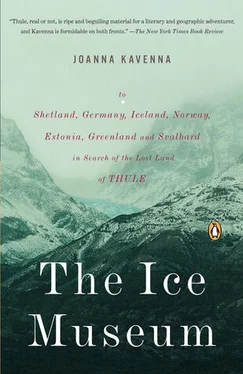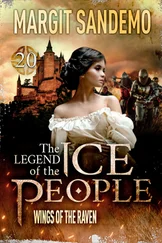In southern Estonia, I took the ferry across the sea to Saaremaa, the tree-covered island where the meteorite fell. Under a cold sky, the ship crossed the sea, and the sky was full of seabirds circling the wake. I drove out into more forests, fine empty forests, along a road without cars which snaked through the island. There was a thick mist falling across Saaremaa; the road slipped away into whiteness. I missed the turn to the meteorite site, and drove on towards a small town, called Kuressaare, where the mist was still thicker. I could see a few houses, and a castle at the end of the street with what appeared to be a drawbridge. There was a health spa on the shore, full of people in towelling robes, where I tried to ask for directions, but the atmosphere was so cranky and medicinal that I left without finding anyone to ask. The mist lingered along the coast, rolling off the pale sea. I stepped into a bar and asked for directions from a pale blond man who was sitting at a table. He pointed me back along the road.
‘If I said tuli to you, what would I mean?’ I asked.
He was nonchalant and friendly. He considered the question thoughtfully, as if people often came to the bar asking him to define random Estonian words.
‘You would mean “fire,” ’ he said.
The second time the mist had cleared and I saw the sign to the meteorite site pointing off the road, towards a patch of woodland. The land was completely flat, until a sudden hill, which swept the forest up at a sharp angle. I walked up the rise, and at the top I could see that the hill was part of the circular ridge of a hole. It was the hole gouged out by a burning rock, when it crashed into the flat soil of Saaremaa. The circumference was impressive, and a lake had formed in the crater. The brown water of the lake reflected the trees, which clung on to the hillsides, hunched towards the lake as if they were sliding slowly down the slope into the water. Everything was focused on the large crater hole. The forest was silent and the mist swept around the sides of the crater, sidling along the branches of the trees. I was blanched out of the meteorite hole, as the mist obscured the view across the waters.
In the Kalevala , there was a story about the ‘fire from Heaven.’ The Old Man of the sky sent fire to the earth, splitting the heavens, spilling a spark of fire through the clouds. Väinämöinen and Ilmarinen decided to go and find out what the fire was that they had seen. The spark had fallen from the sky, piercing the clouds, and the flame had whirled through lands and swamps, until it plunged into the waters of a lake in Finland. The lake nearly caught fire, and the waters were flushed red from the flame. Three times in a night the lake foamed as high as the spruce trees around its banks, roaring to its brim from the force of the fire, leaving the fish stranded on the shore. At the time, the queen of the north had stolen the sun, so the hero-gods decided to fish for the fire. Settling themselves on a patch of unscorched land, they unravelled a twine into the water and brought up the fire, but the fire escaped, singed Väinämöinen’s beard, and disappeared into the distance, setting the juniper heath alight, burning up the spruce glades, and burning half of the north.
A blast with the force of an atomic explosion, Meri said. It must have had a profound effect on the tribes that saw it—a blazing sun falling to the earth, suddenly, without any noise, then a great explosion and a raging fire in the forest, a cloud of dust darkening the sky. The president thought that Thule had been a thing, not a place. Thule was a rare and terrifying event in the history of the Baltic region. It had been the fire which burned in the east, Thule the flame. The ancient Germanic tribes, reeling from the shock of seeing the sun falling to the earth, understood that even the gods could die. The locals, living in the marshes on Saaremaa, muttered through generations about a Great Fire. It was a story in their land, but it came from a particular place, and they offered to show Pytheas where it had happened. They showed him where the sun fell from the sky, but when Pytheas’s account of his journey disappeared, and Pytheas’s story was made and remade from leftover fragments, later writers thought he had meant the setting of the sun in the land of Thule.
The meteorite fell on the land, and thousands of years later Meri felt it added a layer of irony to Nazi destruction, that the Nazis were desecrating the basis of their myths, the event that spawned the idea of Götterdämmerung . This is where it came from, Meri had said, and in this way Thule was a story about the origins of the German people, though it was far from the ‘Aryan’ utopia the Nazis had imagined. It was a story of an original trauma, an original terror, which changed the way these early tribes saw the world. All of this was impossible to prove, impossible to justify except as an elaborate fantasy, but Meri’s idea worked as well as Nansen’s idea about Thule, or Burton’s. Meri’s Thule was as much of a patchwork of fragments and imaginative reconstruction. Meri wanted the word Thule for his nation, and for Meri, Thule was a purgatorial fire, sweeping across the land. It made Thule less a dream of an ideal place and more an event beyond the control of humans, beyond the understanding of early tribes. The witnesses of this fiery Thule were the shocked locals, staggering from their fields and marshes, seeing the fire blazing into the earth, burning for days, the clouds of ash blackening the sky.
And as I left Estonia I thought of the ancient philosophers of Thule, gathering their sources, batting the story from nation to nation. Thule had been a mystery, an expression of curiosity about the indeterminate edges of the world, part of the urge to complete the map. But the story had long been entwined with power and conquest; Caesar saw the conquest of the last land as a triumph for his empire, Virgil imagined Augustus lord of all the lands, even as far as Thule. Meri had tried to lift Thule out of the scrabbling sets of hands, by suggesting that Thule was something beyond the human world. He saw Thule as a story about the power of nature itself, the force of celestial objects, the terrible energy of fire. One Thule might be swamped by unwanted visitors. Another Thule might be smashed and burned. Another Thule might be destroyed by the Nazis, then by the Russians. Meri had asked for the story back, as if it were a piece of national memory, a national dream, forgotten during the occupation.

NORTH! NORTH INTO THE WHIRLWIND! NORTH TO THE MOCKING GALE!
TOWARD THE LASH OF THE DRIVEN SNOWFLAKES WHERE THE SCOURGED
SEA-DOGS QUAIL!
SAW HE NO RUBY TOWERS? LONGED NOT FOR SOFTER LAND?
AYE! BUT A TENSER POWER GRIPPED AND DIRECTED HIS HAND!
BUT RATHER TO GO WHERE OTHERS HAVE NOT, TO CONQUER WHERE ALL
HAVE LOST,
TO BATTLE THE FRENZIED HURRICANE WHILE HOPE IS A NAKED GHOST.
SUCH IS THE POWER THAT DRIVES HIM INTO THE TORTURING GALE; THIS IS THE RUGGED GOAL, THIS THE DESIRED GRAIL!
“ULTIMA THULE,” THOMAS CALDECOT CHUBB (1899-1972)
It had been a conversation running through thousands of years. There were key players, more strident voices—the classical writers, setting the scene, Strabo writing irritable prose, because he never really believed in Thule anyway, Virgil and Pliny, Geminus of Rhodes and Pomponius Mela, and Tacitus speculating about Agricola, and Ptolemy finding a place for Thule on his map of the world. There were studious kings and clerics writing up the latest findings on the north, from Alfred the Great to Bede to Adam of Bremen, mingling them with classical stories. There were Vikings, ploughing across the oceans, Ottar the Viking, Erik the Red—burly men, covered in scars. There was Petrarch wondering where Thule might be. There were the Spanish and Portuguese explorers finding new worlds and carrying Seneca in their packs. There was Burton, insistent that Iceland was so very obviously Thule, agreeing with Columbus who had sailed up to Iceland and called it Thule. There was Nansen immaculate in spurs, talking about Norway and Thule. Now, there was Lennart Meri in his small country, crafting an ancient past for his nation.
Читать дальше













